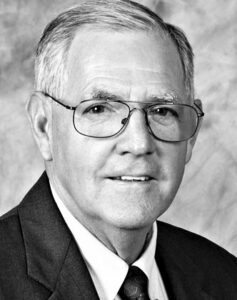“I myself am convinced, my brothers, that you yourselves are full of goodness, complete in knowledge and competent to instruct one another” (Romans 15:14).
In this passage the NIV uses the word “instruct,” while others translate it “admonish” or “counsel.” In all of these translations, Paul gives the Roman Christians credit that they had (through the Holy Spirit) the knowledge and spiritual ability to look after each other. In other words, they were capable of counseling one another regarding their obligations to the Lord, to each other and to the world around them. The majority of those Roman Christians probably had little formal education and many of them were slaves. Yet, Paul teaches them that they are to instruct, admonish, or counsel each other on how to live the Christian life.
In our culture today we are being told that we are individuals who can live life the way we want to. We do not need others telling us how to live. We are capable of going it alone and doing it our own way. Further, we especially do not need “self-righteous people, church-going hypocrites, religious fanatics, or some book written centuries ago” to tell us how to live. We are quite capable of making our own life decisions without outside interference!
As the church is more and more influenced by the standards of society, rather than the objective Word of God, this individualism and opposition to authority has become rampant even among professing Christians. The thought of other Christians interfering in our lives, especially admonishing us, would raise serious objections among many in our churches today. Despite that, Paul’s words are timeless and are as much in need today as they were in the first century—perhaps even more so as individual personal standards have supplanted our objective standard of authority—the Bible.
Peter writes that God, by “His divine power, has given us everything we need for life and godliness through our knowledge of him” … and through God’s “great and precious promises” … we “may participate in the divine nature and escape the corruption in the world caused by evil desires” (1 Peter 1:3–4). Peter is telling us that through our relationship with the living Lord and by His inspired Word, we have what we need to live the Christian life. We do not depend upon the standards of the world, psychiatric formulas and behavior studies. Instead, we need to know what the Word of God says and then to responsibly obey that Word. That same Word (properly interpreted and applied) is the authority for us to use in counseling one another. We are not to press our own opinions and subjective morality on one another, but rather the clear teachings of God’s Word.
As the church is more and more influenced by the standards of society, rather than the objective Word of God, this individualism and opposition to authority has become rampant even among professing Christians.
Paul tells us that “All Scripture is God-breathed and is useful for teaching, rebuking, correcting and training in righteousness” (1 Timothy 3:15). Paul’s statement is set in the context of the elders who use the Word of God in training church members in righteous living. But the same principles apply to the individual member. His privilege and duty is to take that “God-breathed” (inspired) Word and use it, first in his own life and then in the lives of fellow believers. His duty is to correctly apply the specific commands and implied principles. These must never be wrenched from their context. As proper principles of interpretation are employed, the Spirit uses the Word to change lives dramatically. That is how we are to counsel one another.
Paul, in Galatians 6, gives us directions as to who among us should be counseling others. It is those “who are spiritual” (vs. 1). In the previous chapter, in verses 19–26, it is clear that the spiritual are those who are not living in the “acts of the sinful nature,” (sexual immorality, impurity, debauchery, jealousy, dissensions, etc.) but rather those who are living by the “fruit of the spirit” (those who are generally characterized by love, joy, peace, patience, etc.) These are the members who are called upon to restore a brother who has been trapped in some sin (vs. 1). Paul goes on to tell us that we are to be gentle toward one another, to watch ourselves also that we do not ourselves fall, to carry one another’s burdens (vss. 1–2). There is a proper way to approach others who need change in their lives; it is one of gentleness, patience and humility.
However, one is not to be so patient that he allows sin to go unchecked in the body. There will be those times when we say “enough is enough,” and we must courageously call for change. New Testament examples can be found in the cases of Ananias and Sapphira (an extreme example, Acts 5), a man involved in immorality with his father’s wife (1 Corinthians 5), those who were taking the Lord’s supper in an unworthy and unloving manner (1 Corinthians 11) and Euodia and Syntyche, who were feuding (Philippians 4:2).
Counseling one another involves not only dealing with sin, but also encouraging those who are suffering from depression, discouragement, loss, or grief. Paul demonstrates this aspect of counseling in 1 Thessalonians where he encourages those who have had family members and friends who have died. (See 4:13–5:11; see also 1 Corinthians 15 where he talks about the resurrection and the fact that death no longer has a sting for the believer.) Peter closes his letter with wonderful words of comfort to those who, as a result of their faith, have been scattered, with these wonderful words of comfort: “And the God of all grace, who called you to his eternal glory, after you have suffered a little while, will himself restore you and make you strong, firm and steadfast” (1 Peter 5:10).
Paul gives words of comfort about the suffering we must undergo as believers. He tells us that we should rejoice in our suffering, because “suffering produces perseverance; perseverance, character; and character, hope. And hope does not disappoint us, because God has poured out his love into our hearts by the Holy Spirit, whom he has given us” (Romans 5:3–5).
Our roles, therefore, as counselors to one another are not only to deal with sin, but also to offer comfort and cheer. Further, we are to train and instruct others in righteousness (see 1 Timothy 3:16 quoted above). Our counsel has both a corrective purpose and a training process. Admonition by itself can create serious relational problems. It is when we take the time to gently train others in the way of righteousness that we complete the God-ordained cycle.
Here are some practical suggestions as to how we should counsel one another (though this is not to be construed as a complete list):
• Make sure that our own lives are exemplary. Not perfect! No one is! But our overall lives should be such that the people whom we are counseling have respect for us. Christ is clear (Matthew 7) that we should first clean up our own lives before we correct someone else.
• Always pray before approaching another person and when possible, pray with that person. Remember that God is the one who changes people.
• If there is a sin involved, we need to know clearly what the Bible has to say about it. We must make certain that it is a sin, not something that we must learn to forbear.
• If a fellow member is discouraged we need to find out the basis of that discouragement and talk with that person about the provisions and promises which our Lord has given to us in His Word.
• Often we will deal with people who have lost hope. Those people must be helped to see that through the power of the Spirit of God their lives and their outlook can be changed.
• We must encourage those whom we counsel to be in the Scriptures frequently. Leave with them directions to those specific portions of the Word of God which address their situations.
• We need to encourage those whom we counsel to regularly spend time in fellowship with and in service to a caring, local church.
• Enlist the help of others who will also come alongside them and who will befriend, counsel and encourage them.
• When there are matters to which they need to attend, check up on them to make sure that they are doing their part. If they have sinned against someone, direct them to seek that person out and ask for forgiveness. If they are spiritually lazy, remind them of their obligations as believers. Get involved with them, showing not only by words, but also by example how one serves the Lord. If they are depressed or discouraged, spend time with them; do not allow them to sit alone at home enumerating their problems. Talk to them about their responsibilities, but also help them to see their unnoticed blessings.
• Always be truthful with them and urge them to be the same with you. Unless you know the real problems with which you are dealing, you are stumbling in the darkness as you try to help them.
• Encourage them to take steps toward progress—not perfection. Notice their progress and encourage them that they are making progress. It is sometimes difficult for people with problems to take giant strides. Remember and remind them, that many small steps ultimately measure up to real changes.
There is nothing as joyous as seeing those whom you have counseled becoming once again useful members of Christ’s kingdom. In many cases you will have also created a close relationship with that person, and will rescue a Christian brother or sister—and may have gained a close friend for life.

This article is an excerpt from Curtis Thomas’ book – Life in the Body of Christ: Privileges and Responsibilities in the Local Church. A new hardcover edition is now available to order for $19.98 at press.founders.org




























